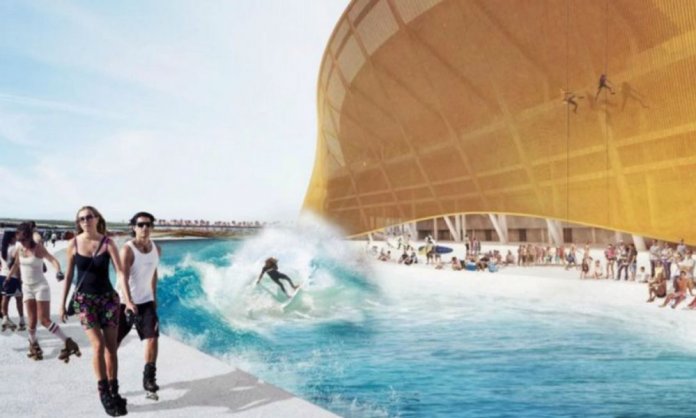A perfect wave, again and again, made to order? It’s the sort of thing that surfers all over the world might dream of as they bob about in the ocean, waiting in vain for the next foaming ticket to ride.
But while Mother Nature may be unreliable, a machine on display in this sun-baked corner of rural California this weekend, more than 100 miles (160 kilometers) from the Pacific Ocean, will serve up wave after wave for an elite-level surfing competition.
The Surf Ranch is the brainchild of legendary 11-time world champion Kelly Slater, a prototype of the giant wave pool that might one day be used to stage surfing competitions at the Olympics.
With surfing set to make its bow at the 2020 Tokyo games, the venue for the competition — natural waves or man-made — is still to be formally confirmed.
The Slater-inspired facility on show in this sleepy California town aims to present itself as a viable option for competition.
The center-piece of the Surf Ranch is a giant 640-meter long pool, where a huge metal hydrofoil is pulled along a track at one edge of the water, churning out consistent barrels and tubes.
“I always thought that if surfing is to grow it would have to be in a controlled environment,” Slater told AFP.
“I like to think that this could be part of the future. I don’t know if it THE future,” the 46-year-old added. “I think the ocean can’t be replaced. I think big waves can’t be replaced. I think the randomness of what happens in the ocean and in mother nature is a big part of why we love surfing.”
Unlike conventional surfing competitions, where the timetable is often at the mercy of the elements, at the Surf Ranch, waves are delivered more or less to order. For a competition like the Olympic Games, ever mindful of television audiences, that makes it an attractive proposition.
– Olympic future? –
The World Surf League (WSL) has bought the California facility and the concept from Slater. Construction on a similar site in Japan is set to begin later this year, and will be available to Tokyo 2020 if required, according to WSL chief executive Sophie Goldschmidt.
“So we are going to be building one in Tokyo and we hope that if it’s built and tested in time then the Olympics will consider using it because the waves at that time of year are not the best,” Goldschmidt said. “Ultimately it is not our choice.”
This weekend, Slater will captain a United States team in a WSL exhibition tournament which also includes Brazil, Australia, Europe and a team from the rest of the world.
Brazil’s Gabriel Medina and Australian veteran Mick Fanning and women’s stars Stephanie Gilmore (Australia) and Lakey Peterson (USA) are just some of the surfers who will be taking to the water.
So far, the surfers have been impressed by the man-made lake which delivers waves averaging around six feet high and traversing roughly 700 yards, offering barrel and manoeuvre sections.
“It’s easier,” admitted Brazil’s Filipe Toledo. “In the ocean it is more challenging because you’re relying on nature, waiting. Here you get a perfect wave every three minutes.
“Everyone gets the same conditions, the same opportunities, so the best surfer will win, and not necessarily one who makes a mistake or does not take enough risks.”
Gilmore, too, believes the venue makes for a true test of talent. Competitors would no longer be able to “blame it on the ocean” if they failed to deliver, she said.
The WSL are adamant, however, that artificial waves or “stadium surfing” will never replace traditional beach competitions.
“The ocean is as important as ever,” Goldschmidt said.
Slater meanwhile is dreaming of crowning his career with an appearance at the Olympics.
“It would be a great honour, to mark 40 years of competitive surfing like that,” he said.
































